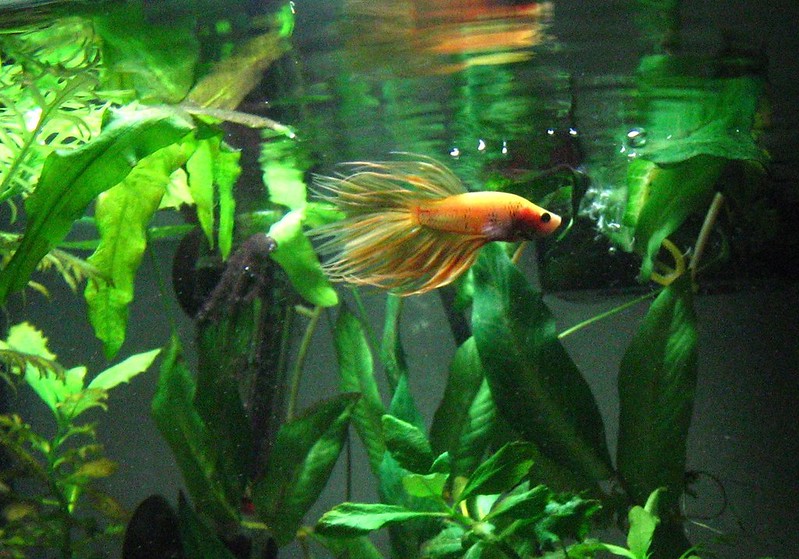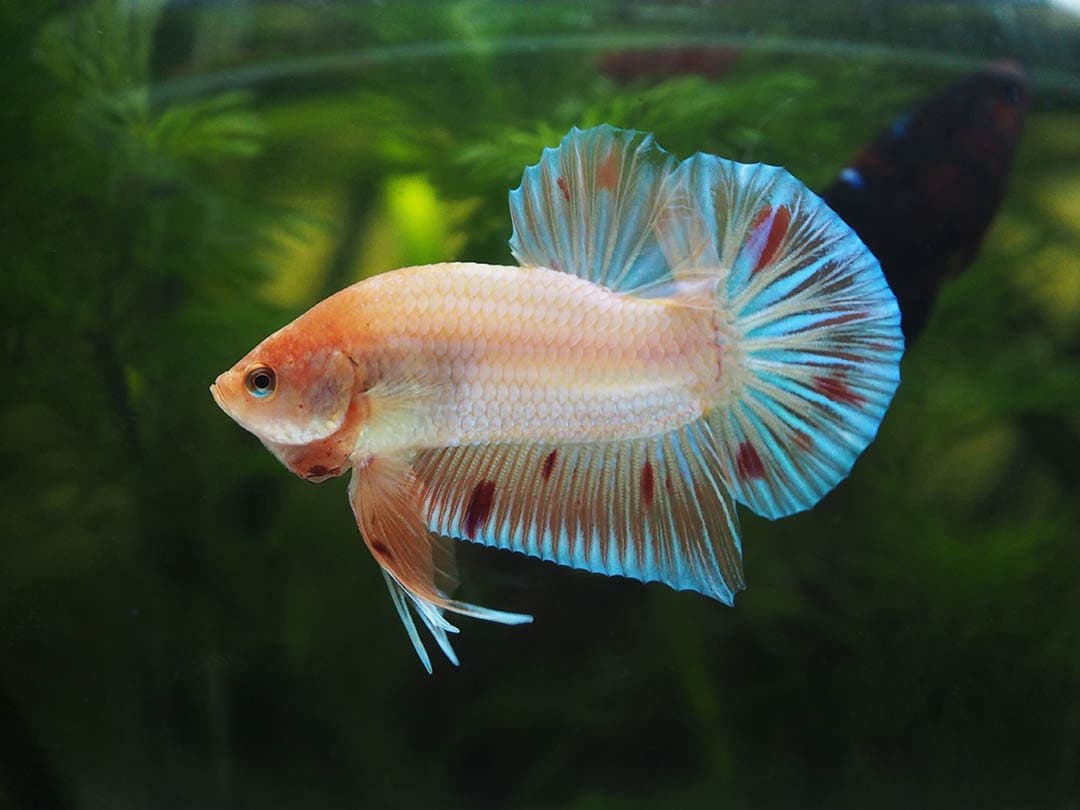These fish can technically eat goldfish food and digest it—for a time. However, Betta fish are carnivores, while goldfish are largely herbivores. Goldfish flakes are usually high in veggies and fruits, which are the last things that Betta fish need.
Goldfish flakes can be fed to your Betta fish in a pinch, but they shouldn’t be their main food. Instead, choose a food that contains almost exclusively meat. Such pellets will keep your Betta fish the happiest and healthiest.
Giving your Betta fish goldfish flakes just once won’t kill them, but it also won’t be good for their stomachs. In the long run, these flakes will lead to nutritional deficiencies and health problems.
As a betta owner you want to provide the best possible nutrition for your aquatic buddy. With shelves stocked full of colorful fish foods, it’s tempting to toss in a variety. But can bettas actually eat foods designed for other species like goldfish? Let’s dive in to the details.
An Intro to Betta Nutrition Needs
Betta fish are carnivores that thrive on high-protein diets. Their natural menu includes:
- Insects
- Larvae
- Zooplankton
- Small crustaceans
This insectivorous appetite means bettas require very different nutrition from omnivorous community fish like goldfish. Foods catering to goldfish contain lots of plant matter bettas can’t properly digest.
Bettas need a diet rich in meaty morsels to do well in captivity. Flakes or pellets with primarily fish shrimp or insects as the first few ingredients make the ideal betta cuisine.
What’s in Most Goldfish Foods?
Goldfish foods typically contain
- Plant proteins from soy, wheat, corn
- Fruits and veggies like spinach, apples, peas
- Some fish meal for protein
Formulas aim for a balance suited for goldfish, not the high protein levels bettas need. Feeding goldfish food regularly can leave bettas deficient and prone to health issues.
Risks of Feeding Goldfish Food to Bettas
While the occasional goldfish snack may not harm bettas, making it a dietary staple poses problems:
-
Malnutrition – Lack of protein and improper vitamin ratios can lead to illness over time.
-
Digestive troubles – Insoluble plant matter can cause chronic constipation or bloating.
-
Organ stress – Excess carbs and plant proteins tax the kidneys and liver.
-
Dull coloration – Nutrient deficiency saps vibrant reds, blues, and greens from betta fins and scales.
Without tailoring nutrition to meet their carnivorous needs, bettas fail to thrive on goldfish flakes.
Can Bettas Digest Goldfish Food at All?
Bettas can technically digest some goldfish food thanks to their omnivorous ability to eat both plant and meat matter. Their digestive tracts will attempt to break down and absorb nutrients from goldfish flakes.
However, plant proteins and fibers, like soy, wheat, and veggies, contain compounds indigestible and irritating to betta intestines. Eating them regularly strains their systems.
Bettas lack the gut enzymes and microbiome goldfish have to extract sufficient energy from the carbohydrate-heavy ingredients. While bettas can ingest goldfish food, they can’t utilize it well nutritionally.
Nutritional Comparison of Goldfish vs. Betta Foods
Here’s how goldfish and betta foods differ in nutritional content:
| Goldfish Food | Betta Food |
|-|-|-|
| Protein | 25-35% | 40-50% |
| Fiber | 5-8% | 2-3% |
| Fat | 4-7% | 8-12% |
| Carbs | 25-40% | 20-30% |
It’s clear betta foods deliver the high protein and low carbs and fiber suited to carnivores. Goldfish foods don’t align with bettas’ nutritional needs.
Health Consequences of Feeding Goldfish Food Long-Term
While an occasional nibble of goldfish food likely won’t harm bettas, making it a regular part of their diet can cause:
- Constipation from excess fiber
- Swim bladder disorders from inadequate nutrition
- Fin damage from vitamin deficiencies
- Organ dysfunction from high carbohydrate load
- Shortened lifespan from malnutrition
Supporting betta health requires catering to their high-protein requirements goldfish foods don’t provide.
When Goldfish Food May Work as a Betta Supplement
In certain circumstances, small amounts of goldfish flakes can supplement a betta’s diet:
- For wild-caught bettas adjusting to captivity
- To stimulate appetite in recovering or sick bettas
- For picky eaters refusing other foods
Use goldfish food sparingly in combination with proper carnivore pellets or freeze-dried insects. This gives picky bettas some nibbles while sustaining them on better protein sources.
Tips for Feeding Bettas in a Community Tank
If housing bettas with goldfish, a few strategies prevent accidental goldfish food consumption:
- Research compatible tankmate species and temperaments
- Monitor tank conditions to keep all inhabitants comfortable
- Feed goldfish flakes quickly so bettas can’t access them
- Target feed carnivore pellets or bloodworms to bettas when goldfish aren’t looking
- Avoid overfeeding to prevent goldfish leftovers from sinking
With some planning, you can successfully keep appropriate foods separated.
Best Practices for Feeding Bettas
To keep your bettas vibrant and healthy, follow these diet best practices:
-
Choose a high protein pellet or flake formula specifically for bettas
-
Feed 2-4 small pellets once or twice daily; fast 1 day a week
-
Supplement with freeze-dried or frozen treats like bloodworms or brine shrimp
-
Soak dry foods in tank water before feeding to prevent bloating
-
Vary protein sources for a balanced amino acid profile
-
Avoid overfeeding to prevent waste fouling the water
The Verdict: Should You Feed Your Betta Goldfish Food?
While bettas can ingest some goldfish food, the nutritional imbalance poses risks of malnutrition and illness in the long run. Feed goldfish their omnivore flakes, and give your carnivorous bettas the high-protein fare they require.
With species-specific foods catered to their needs, both goldfish and bettas can thrive without competing for meals. Paying attention to their unique appetites will lead to happy, healthy aquarium inhabitants all around!

Can a Betta Fish Eat Regular Fish Food?
Betta fish are not omnivores, so most fish food that isn’t made for a specific species is made for them. Therefore, they cannot eat it. It likely won’t kill them, but it isn’t going to contain what they need in their diet. They won’t thrive on it and will likely live a shorter lifespan than they could have otherwise.
Just like people, feeding Betta fish the wrong diet will damage their health.
When judging whether your Betta fish can eat a particular food, take a look at the ingredient list. The food should contain different fish meats. Preferably, this should make up most of the food. It’s likely that there will be some binders to keep the pellets together, but the first few ingredients should come from fish.
If the food seems heavy in fruits or veggies instead, it isn’t made for a Betta fish.
Will Goldfish Food Kill a Betta?
Betta fish have pretty stout digestive systems, so they can digest goldfish flakes to a certain extent. However, they evolved to live off of a protein-rich diet of mostly insects, some invertebrates, and other fish. The fruits and vegetables in goldfish flakes won’t give them the nutrition they need to grow and do well.
You likely won’t notice a problem at first. However, as your betta continues to be fed the incorrect diet, they may become lethargic.
Without the proper diet, the Betta fish will eventually develop nutritional problems. These can be hard to notice in a fish. Typically, they will appear dull and lethargic before eventually succumbing to certain ailments and then passing. In some cases, they may just get parasites or an infection first because their immune system won’t work right if they eat bad food.

What Is the Best Food for Betta Fish?
Can betta fish eat goldfish?
Betta fish and goldfish have different dietary needs. Bettas are carnivores and goldfish are omnivores, so goldfish food may not provide the necessary nutrients for bettas. Feeding your Betta fish well is essential in ensuring their health, vitality, and happiness. Keep their diet well-balanced and provide them with a variety of food options to whet their appetites.
Is gold fish good for health?
Like any other fish, gold fish is also edible but poor in nutritional value. As gold fish is used mostly for aesthetic purposes, its habitat is mostly artificial and food consists of gross flake or pellet stuff. Thus, gold fish should be raised as a pet and not be eaten as it tastes exactly like its food.
Can betta fish eat live food?
Betta fish can eat live food. Before introducing live food to the tank water, remember to rinse it to avoid transferring bacteria or parasites. Always thaw frozen fish food before giving it to your Betta, and remember to rinse and soak dried food before feeding it to prevent digestive issues.
How should you feed a Betta fish?
To ensure the health of your Betta fish, remember to fast them once in a while. Provide live or frozen Betta food as much as possible, as these are most nutritiously similar to their natural food sources. Betta fish are some of the easiest pet fish to keep in a home aquarium.
